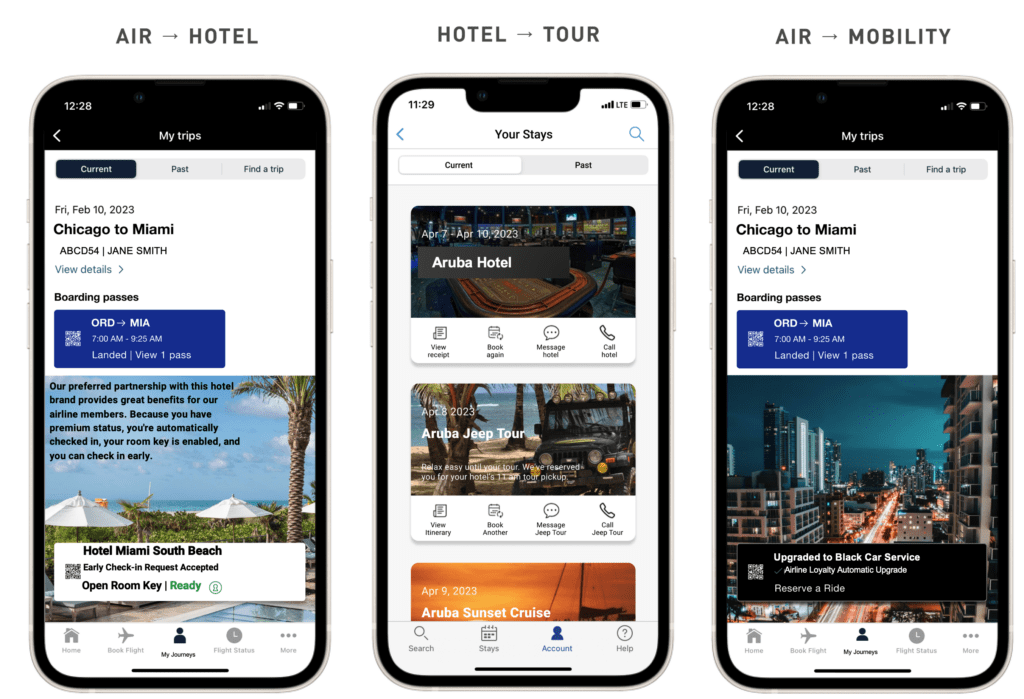[ad_1]
Skift Take
Based on the company’s claims, Journera’s product could answer travel company prayers for better connectivity — but as with any startup, the trick is getting potential clients to agree.
Travel companies have been trying to knit together the fragmented pieces of the customer journey for years.
The goal has been for seamless communication of valuable customer data between companies — flight, hotel, ground transportation, restaurants, event vendors, and more — for upselling, better service, and so the traveler can easily manage all aspects of a trip through one system.
Jeff Katz says his software startup, Journera, has developed a tool over the last several years to help companies get closer to that goal. That startup is now selling use of that platform, called TripSignals, to existing and new customers. Journera offered some data sharing services before, but this is the iteration of the product that Katz has been working toward, he said.
Katz has understood the need for this type of connectivity for years as he was formerly the president of Sabre, founding CEO of Orbitz, and CEO of Swissair.
“All of the data comes from very disparate systems, so you have to bring them together,” Katz said. “Amadeus is an investor in our company; they’re a magnificent company, so is Sabre and so forth. But nobody sees all the data, not Google, not Sabre, not a particular brand, not an [online travel agency], nobody sees it all. So if you care about this, you have to think of an ecosystem that allows it to come together.”
As long as “explicit permission” — he emphasized that point — is granted by all parties, many types of detailed, real-time customer data can flow from one company to another through the platform, Katz said. That could be the basis for a number of revenue-driving uses.
“There’s processes that happen when you’re on the journey that I think are untapped,” he said.
“We’re talking about the next stage of what could partnerships do. You could really deepen offers, you could deepen services.”
He highlighted that the platform could allow a hotel to see that a customer’s plane has landed, and then authenticate that guest and provide a digital room key in the same app that was used for the boarding pass.
“You cannot do that without the TripSignals,” he said.
Or, an airline could see when someone checks out of a hotel and use that as a signal to send an offer for a seat upgrade. Or a ground transport company could see when the customer is deboarding a plane, and if that plane is early or late, and then offer a taxi. Companies could also exchange restaurant or event reservation information, and they could make special offers based on loyalty levels or something else.

Big travel companies, including Booking Holdings, that have access to huge amounts of travel data talk regularly about the importance of this connected trip concept and their efforts toward realizing it. Though it has been an effort years in the making, it still has not happened at the level industry leaders envision, likely because of reasons like
“And I question whether any player can truly achieve it,” said Pranavi Agarwal, a senior research analyst for Skift.
In that case, maybe travel companies would be more willing to share data as long as all sides can see a benefit in doing so. It is not unheard of, after all, for companies to partner with each other to share data and expand services. Booking.com and Uber both have partnered with Viator, for example, as a way to cross-sell products
Now, Journera is in the process of persuading existing and new customers to subscribe to the platform. More companies are obviously better than fewer, but the platform could allow even just a couple of companies to more effectively work together, he said. Clients using previous iterations of Journera’s data sharing capabilities include Hilton, Hyatt, American Airlines, United Airlines, and more.
“I’m looking for just a few customers to begin to use this capability to make their guest experience or their airline experience better and more profitable for them,” Katz said. “We’re focused on folks who we believe are ready. In the first mover sense, they’re not always the biggest.”
The pandemic disturbed some of that work, but Katz believes the technology is now more relevant as companies are looking for ways to improve efficiency and maximize revenue.
Still, travel companies are strapped for resources, and as part an industry that is notoriously behind the times, they may have other projects they see as bigger priorities.
“I would say our biggest challenge is establishing a mutual belief with our customers that the [connected] journey is the next frontier of improving their business — and making that a priority,” Katz said.
“They’re really disciplined prioritizers, so getting in that priority queue is a tough one. We’re pretty easy to work with, but this is a newer idea, and it has to compete with other newer ideas, like AI, or even older ideas that are moving along, like personalization.”
Journera has raised more than $30 million in venture capital, most recently $10 million last year. And the fundraising is continuing, he said.
[ad_2]
Source link

